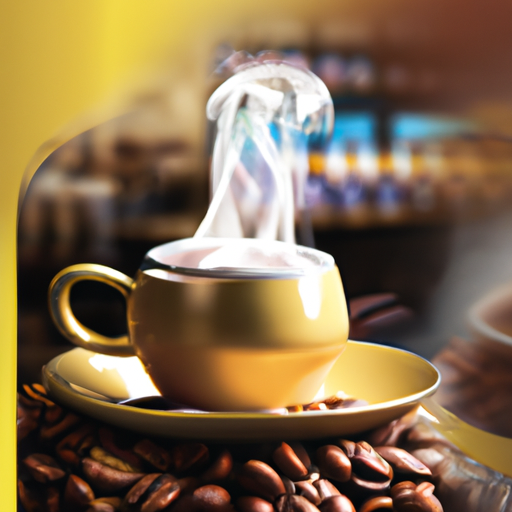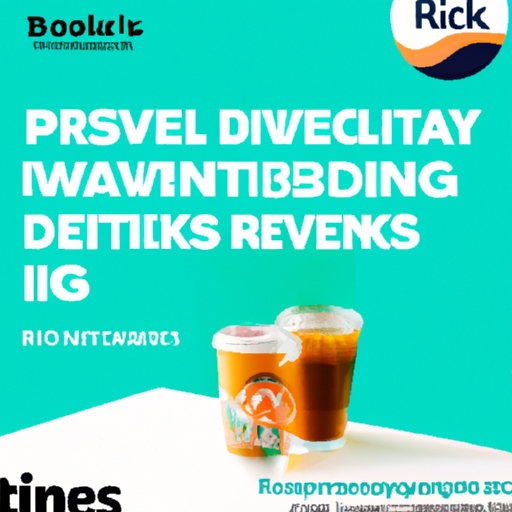Coffee Industry Trends
Does the aroma of freshly brewed coffee make your senses come alive? If so, you’ll be intrigued to discover the latest Coffee Industry Trends that are shaping our caffeinated world. From unique brewing methods to sustainable sourcing practices, this article uncovers the dynamic shifts happening within the coffee industry. Discover how specialty coffee is gaining popularity, the rise of functional ingredients, and the growing demand for eco-friendly packaging. Get ready to embark on a caffeinated journey and explore the fascinating trends that are revolutionizing the way we enjoy our daily cup of joe.

Table of Contents
Market Growth
Increasing global consumption
The coffee industry has witnessed a rapid increase in global consumption over the past decade. As more and more people around the world develop a taste for coffee, the demand for this beloved beverage continues to grow. Emerging markets in countries like China and India have played a significant role in driving this global consumption growth. With larger populations and rising disposable incomes, these markets have become increasingly important players in the coffee industry.
Emerging markets driving demand
The emerging markets of China, India, and Brazil have emerged as key drivers of coffee demand. In these countries, coffee is no longer seen as just a trendy drink but has become an integral part of the daily lives of many individuals. The increase in urbanization, changing consumer preferences, and the influence of Western culture have all contributed to the growth of the coffee industry in these regions. As a result, multinational coffee chains and local coffee shops have been expanding rapidly, catering to the growing demand for coffee.
Sustainability
Growing focus on sustainable farming practices
As awareness about environmental issues continues to rise, there has been a growing focus on sustainability within the coffee industry. Coffee farmers have started adopting more sustainable farming practices to ensure the long-term viability of their crops. This includes using organic fertilizers, conserving water, and implementing shade-grown farming methods. By adopting these sustainable practices, coffee farmers not only protect the environment but also enhance the quality of their coffee beans.
Rise in demand for eco-friendly packaging
With consumers becoming increasingly environmentally conscious, there has been a significant rise in the demand for eco-friendly packaging within the coffee industry. Many coffee brands have responded to this trend by investing in sustainable packaging materials such as biodegradable coffee pods, compostable coffee bags, and recyclable cups. By embracing eco-friendly packaging, coffee companies contribute to global efforts to reduce plastic waste and promote a greener future.
Shift towards fair trade and direct trade
Another sustainability trend in the coffee industry is the shift towards fair trade and direct trade practices. Consumers are becoming more aware of the social and economic challenges faced by coffee farmers in developing countries. They are actively seeking out brands that support ethical sourcing and fair wages for farmers. Fair trade and direct trade certifications ensure that coffee farmers receive fair prices for their beans, enabling them to improve their living conditions and invest in their communities.

Innovation
Introduction of cold brew and nitro coffee
In recent years, the coffee industry has witnessed the introduction and subsequent explosion in popularity of cold brew and nitro coffee. Cold brew is made by steeping coffee grounds in cold water for an extended period, resulting in a smooth and less acidic beverage. Nitro coffee takes cold brew a step further by infusing it with nitrogen, creating a creamy and velvety texture. These innovative coffee products have captured the attention of avid coffee drinkers who are always on the lookout for new and exciting flavors.
Expansion of flavored and specialty coffees
The expansion of flavored and specialty coffees has also been a prominent trend in recent years. Coffee enthusiasts are continually seeking unique and enticing flavors beyond the traditional options. From indulgent flavors like caramel, chocolate, and vanilla to exotic options like hazelnut, coconut, and cinnamon, coffee companies are continuously innovating to cater to diverse consumer preferences. Additionally, specialty coffees, such as single-origin beans and microlots, have gained popularity among coffee aficionados, who appreciate the distinct flavors and characteristics of these premium offerings.
Adoption of alternative brewing methods
To meet the demand for personalized coffee experiences, the coffee industry has seen a surge in the adoption of alternative brewing methods. Methods such as pour-over, French press, Aeropress, and espresso-based drinks like macchiatos and cortados have become increasingly popular among coffee enthusiasts. These brewing methods allow for greater control over the brewing process, resulting in a more customized and flavorful cup of coffee. Coffee shops and homebrewers alike have embraced these alternative brewing methods, ensuring that coffee lovers can enjoy their favorite beverages exactly how they like them.
Convenience
Rise of coffee delivery services
In today’s fast-paced world, convenience is of utmost importance to consumers. This has led to the rise of coffee delivery services, where people can have their favorite cup of joe delivered right to their doorstep. Mobile apps and online platforms have made it easier than ever to order coffee, whether it’s from a local coffee shop or a large chain. From busy professionals who need their morning pick-me-up to students studying late into the night, coffee delivery services have become an essential part of many people’s daily routines.
Integration of technology in coffee shops
Coffee shops have also embraced technology to enhance convenience for their customers. From self-ordering kiosks to mobile payment options, technology has made ordering and paying for coffee faster and more streamlined. Some coffee shops even have mobile apps that allow customers to place orders in advance, ensuring that their drinks are ready as soon as they arrive. The integration of technology not only improves the customer experience but also increases efficiency for coffee shop owners, allowing them to serve more customers in less time.
Increasing popularity of single-serve coffee machines
Another convenience trend in the coffee industry is the increasing popularity of single-serve coffee machines. These machines, such as Keurig and Nespresso, allow coffee lovers to quickly brew a cup of coffee at home or in the office without the need for a traditional coffee maker. Single-serve coffee machines offer convenience through their simplicity, speed, and the ability to brew a variety of flavors with minimal effort. With more and more people seeking convenience in their daily lives, the market for single-serve coffee machines continues to grow.

Health and Wellness
Growing demand for functional coffee
In recent years, there has been a growing demand for functional coffee – coffee that offers specific health benefits beyond the traditional caffeine boost. Functional coffees often contain ingredients such as antioxidants, vitamins, and herbs known for their health-promoting properties. For example, mushroom coffee has gained popularity due to its immune-boosting qualities, while collagen-infused coffee is believed to improve skin health. As consumers become more health-conscious, functional coffee provides a way to incorporate wellness into their daily coffee ritual.
Focus on organic and natural ingredients
Consumers today are increasingly concerned about the quality and origin of the products they consume, and coffee is no exception. There is a growing focus on using organic and natural ingredients in coffee production. This means using coffee beans that have been grown without the use of synthetic fertilizers or pesticides. Additionally, natural sweeteners and dairy alternatives are becoming more popular options for those looking to avoid artificial additives in their coffee. By prioritizing organic and natural ingredients, coffee brands cater to the preferences of health-conscious consumers.
Introduction of low-acidity and low-caffeine options
In response to the growing demand for healthier coffee options, the industry has introduced low-acidity and low-caffeine coffees. These options cater to individuals who may be more sensitive to caffeine or who experience acid reflux or other digestive issues after consuming regular coffee. Low-acidity and low-caffeine coffees offer a milder flavor profile and reduced caffeine content while still providing the comforting and enjoyable coffee experience that many people love. This trend reflects the industry’s commitment to inclusivity and catering to the diverse preferences and needs of coffee drinkers.
Premiumization
Increase in specialty coffee shops
The rise of specialty coffee shops is a clear indication of the premiumization trend in the coffee industry. These establishments focus on sourcing and brewing high-quality coffee beans, providing a unique and artisanal coffee experience for their customers. Specialty coffee shops often have highly skilled baristas who are knowledgeable about coffee origins, brewing techniques, and flavor profiles. They take pride in the craftsmanship of their beverages and aim to showcase the diversity and complexity of coffee to every customer who walks through their doors.
Demand for high-quality and unique coffee experiences
Consumers are increasingly seeking out high-quality and unique coffee experiences that go beyond the standard cup of coffee. This includes offerings such as single-origin coffees, rare and limited-edition blends, and unique brewing methods. Coffee enthusiasts are willing to pay a premium for these distinctive experiences, as they value the craftsmanship, attention to detail, and flavors that cannot be replicated elsewhere. The demand for high-quality and unique coffee experiences drives the premiumization trend in the industry, encouraging coffee brands to innovate and delight their customers with truly exceptional offerings.
Popularity of premium coffee subscriptions
Premium coffee subscriptions have become a popular way for coffee lovers to regularly enjoy high-quality coffee in the comfort of their own homes. These subscriptions typically offer a curated selection of specialty coffees from around the world, delivered directly to the subscriber’s doorstep on a regular basis. Coffee enthusiasts appreciate the convenience of having a variety of premium coffees at their disposal, without the need to visit a specialty coffee shop. This trend allows individuals to explore new flavors and expand their coffee knowledge while enjoying the convenience of a tailored coffee experience at home.

Online Retail and E-commerce
Shift towards online coffee purchases
The rise of e-commerce has had a profound impact on the coffee industry, with a significant shift towards online coffee purchases. Consumers can now conveniently browse and purchase a wide range of coffee products, from whole beans to ground coffee to coffee brewing equipment, with just a few clicks. Online coffee retailers provide detailed product descriptions, customer reviews, and even subscription options, making it easier than ever to find and purchase the perfect coffee products. The convenience and accessibility of online coffee shopping have contributed to the overall growth of the industry.
Emergence of coffee marketplaces
In addition to individual online coffee retailers, coffee marketplaces have emerged as a popular platform for coffee enthusiasts to explore and purchase a wide variety of coffee products. These marketplaces bring together coffee roasters, farmers, and brands from around the world, allowing consumers to compare and choose from an extensive selection of coffee options. Coffee marketplaces often feature unique and hard-to-find coffees, making them a go-to destination for those looking to discover new and exciting flavors. The emergence of coffee marketplaces has further expanded the reach and accessibility of the coffee industry.
Subscription-based coffee delivery services
Subscription-based coffee delivery services have revolutionized the way coffee enthusiasts enjoy their favorite brews. These services offer personalized coffee subscriptions tailored to individual preferences, delivering freshly roasted beans or pre-packaged coffee pods directly to the subscriber’s doorstep on a regular basis. With a coffee subscription, consumers can enjoy a steady supply of their favorite coffees without the hassle of regularly visiting a coffee shop or grocery store. These services often highlight unique and specialty coffees, allowing subscribers to explore and discover new flavors from different regions around the world.
Social Media Influence
Growth of coffee influencers on platforms like Instagram
Social media platforms, particularly Instagram, have become a hub for coffee enthusiasts and influencers to share their coffee experiences and recommendations. Coffee influencers, with their curated coffee photos and engaging content, have gained significant followings, influencing the coffee choices and behaviors of their online communities. From showcasing latte art to sharing coffee brewing techniques, coffee influencers play a significant role in shaping coffee trends and driving consumer preferences. Their influence has contributed to the growth of coffee as not just a beverage but also a lifestyle and social media-worthy experience.
Popularity of coffee-related content
Coffee-related content is hugely popular on social media platforms, with hashtags like #coffeelover, #coffeeholic, and #coffeetime generating millions of posts. Coffee enthusiasts enjoy sharing photos of their latte art, coffee setups, and favorite coffee spots, fostering a sense of community among like-minded individuals. Social media platforms have become a space for coffee lovers to connect, learn, and be inspired by each other’s coffee experiences. The popularity of coffee-related content reflects the deep connection that people have with coffee and the power of social media in amplifying this love for the beverage.
Effect of social media marketing on consumer behavior
The coffee industry has recognized the power of social media marketing and its impact on consumer behavior. Coffee brands and coffee shops actively leverage social media platforms to engage with their audience, share their brand stories, and promote their products. By crafting visually appealing content, offering exclusive promotions, and collaborating with influential coffee personalities, brands can effectively communicate their values and offerings to a wide audience. The immediacy and interactivity of social media platforms have created new opportunities for coffee companies to connect with consumers and drive sales.
Millennial Coffee Culture
Preference for specialty and artisanal coffee
Millennials have played a crucial role in shaping the coffee culture of today. This generation has shown a strong preference for specialty and artisanal coffee, seeking out unique flavors, high-quality beans, and carefully curated coffee experiences. Millennials value authenticity, sustainability, and transparency in the products they consume, and this extends to their coffee choices. Whether it’s visiting specialty coffee shops or experimenting with different brewing methods at home, millennials have embraced coffee as not just a beverage but also a form of self-expression and exploration of flavors.
Interest in coffee origin and ethical sourcing
Millennials are more curious and conscious about the origin and ethical sourcing of the products they consume, including coffee. This generation seeks transparency in the supply chains of coffee brands, ensuring that coffee farmers are paid fair wages and that sustainable farming practices are followed. Millennials are interested in learning about the journey of coffee from bean to cup, appreciating the efforts that go into producing their favorite beverage. By prioritizing coffee origin and ethical sourcing, millennials contribute to the demand for responsibly produced coffee and drive positive change within the industry.
Embracing coffee as a social and cultural experience
For millennials, coffee is more than just a drink – it is a social and cultural experience. Coffee shops have become popular meeting places for friends, colleagues, and even dates. Millennials enjoy gathering in coffee shops to catch up, work, or simply enjoy a cozy and welcoming environment. Coffee shops also serve as spaces for cultural events, music performances, and community engagement initiatives. Millennials have embraced coffee as a way to connect with others, support local businesses, and foster a sense of belonging within their communities.
Changing Consumer Preferences
Shift towards healthier and sustainable coffee options
Changing consumer preferences have prompted a shift towards healthier and sustainable coffee options. Consumers are now seeking out coffee products that align with their wellness goals and align with their environmental values. This includes preferences for organic, low-acidity, and low-caffeine coffees, as well as coffee alternatives like mushroom coffee and collagen-infused coffee. Additionally, consumers are actively choosing brands and products that support sustainable farming practices and ethical sourcing. Coffee companies that prioritize health and sustainability are well-positioned to meet the evolving preferences of consumers.
Preference for unique flavors and blends
Coffee drinkers today are embracing variety and seeking out unique flavors and blends beyond the traditional options. Whether it’s trendy flavors like pumpkin spice or unique combinations like lavender-infused coffee, consumers appreciate coffee offerings that surprise and delight their taste buds. This preference for unique flavors and blends extends to both specialty coffee shops and packaged coffee products. Coffee companies that can consistently innovate and introduce new flavors and blends gain a competitive edge in capturing the interest and loyalty of consumers.
Demand for more personalized coffee experiences
Consumer preferences are increasingly leaning towards more personalized coffee experiences. People want to have control over every aspect of their coffee, from the type of beans used to the brewing methods employed. This desire for customization has led to the popularity of alternative brewing methods, single-origin coffees, and even DIY coffee brewing kits. Coffee companies that can provide options for customization and empower consumers to tailor their coffee experience are well-positioned to capture the attention and loyalty of discerning individuals.
As the coffee industry continues to evolve and grow, these trends will shape the future of the industry. From sustainability to technology integration, consumer preferences to global market growth, there are countless opportunities and challenges for coffee companies to navigate. By understanding and embracing these trends, coffee businesses can stay ahead of the curve and continue delighting coffee enthusiasts around the world. So, whether you’re sipping a piping hot cup of freshly brewed coffee at your local specialty coffee shop or exploring the latest coffee offerings online, remember that the story of coffee continues to unfold, driven by the passion and innovation of those who are dedicated to making each cup a memorable experience.






